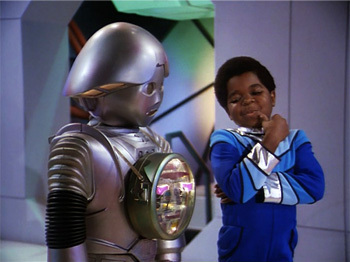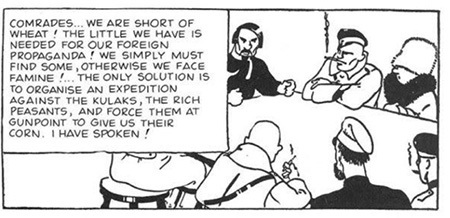5 Famous Kid's Characters You Didn't Know Were Propaganda

Iconic children's characters are generally brightly colored, simply designed, and meant only to educate and entertain the young'uns. But sometimes there are more sinister motives behind their creation. Adults use those bright colors to hypnotize, those simple designs to burn messages into young brains, and the only education they want to pass along is their own political agenda. We've been on high alert for subliminal propaganda, when all this time it's been dancing and singing stupid songs right in front of us!
Early Thor Mostly Used The Power Of The Gods To Fight Communism

You know Thor today as the world's most beautiful hammer-wielding maniac. He mostly fights aliens, or vikings, or viking aliens -- we're not sure, we were too distracted by Chris Hemsworth's flowing locks and boyish smile to pay attention to the plot. But Thor's earliest adventures were mostly about bashing dirty commies.

"THE ODINSON CARES NOT FOR YOUR HAMMER TRADEMARK INFRINGEMENT!"
While Thor's very first appearance had him fending off a familiar alien menace, his second saw him heading to the South American nation of San Diablo, where the nefarious Comrade Executioner (real name: Santiago Chavez Rivera) had been destroying U.S. humanitarian shipments and executing dissidents like it was going out of style.

What's not going out of style? That strawberry beret.
After defeating Comrade Executioner's army and seeing him executed by his fellow communists, Thor moved on to his next adventures: a slap fight with Loki and a quick sojourn into the future. But then he was right back to bludgeoning the Red Scare when he infiltrated Soviet Russia to rescue a group of imprisoned American scientists and send those dirty Soviets straight to Hell. Or rather, the extremely long lines to get into Hell.

"BAH, I'VE NOT BEEN HELD SO HELPLESS SINCE THE FINGER TRAPS OF THE COMMUNIST CHINESE!"
Next he took on a commie spy looking to incite chaos among American production workers, before going head-to-head with the Communist Party of China and a Chairman Mao lookalike. That story ends with Thor -- no shit -- catching Radio-Active Man in a tornado and dropping him on China like an atomic bomb.

"THE ONLY FINGERS YOU CAN HAVE ARE MY MIDDLE ONES. SO SPEAKS THOR!"
Thor's capitalist swan song came in 1965, when, detained Rambo-style by the Viet Cong while saving peasants from Charlie, Thor shamed his captor into committing suicide. After that, he pretty much hung up the commie-bashing. Nowhere to go but downhill from there, anyway.
Early Buck Rogers Battled The Yellow Peril In The 25th Century

Long before achieving prime campiness in his 1970s TV show, Buck Rogers was simply an anachronistic hero saving Future America from hideous Chinamen.

Creator Philip Francis Nowlan needed a good villain, so he leveraged the growing anti-Asian sentiment of the time for Armageddon 2419 A.D. His futuristic Chinese bad guys -- referred to interchangeably as Mongols and Hans -- were pitiless caricatures led by a space warlord responsible for decimating the United States and probably also molesting bald eagles atop a pile of burning American flags.

Buck struggled to wrest control of the former U.S. from the grasp of this sinister race, hoping to wipe the entire "Mongolian Blight" from existence.

"If you look at the math, it all works out. Let me show you on my comically-sized abacus."
Hostile to immigration (and interbreeding in particular), the racist plotlines of the novellas subsisted for years, until Flash Gordon came along and forced the writers to come up with some original material. As the decades passed, future adaptations jettisoned the less savory aspects of the original and introduced a diverse cast of characters to give 25th-Century America a more realistic racial makeup. And by "diverse," we mean one black guy and a dickhead robot.

And we're not calling the robot a jerk ...
The Author of The Jungle Book Was Pro-Imperialism

You probably know the phrase "White Man's Burden," which refers to the old-timey viewpoint that it is the responsibility of the white man to drag the savages kicking and screaming into modernity, even if it kills them. You may not know that the phrase was penned by Rudyard Kipling, author of the much-beloved and oft-reimagined The Jungle Book.
Revisiting the original classic with that in mind lends the story a wholly disturbing connotation. The overarching theme of The Jungle Book and its follow-up, inventively titled The Second Jungle Book, is something Kipling referred to as "the Law of the Jungle" -- basically, a moral code that enables the boy protagonist, Mowgli, to rightfully lord over the lesser animals.

Two legs bad.
Knowing that Kipling was an Indian-born Brit who was all for British imperialism, it becomes clear that The Jungle Book just hastily glued some cutesy animals atop a colonialist agenda. Imperialism and the Law of the Jungle are intimately related concepts, both unquestionably necessary in a world where without those of higher intelligence and cunning to lead them, the natives will surely devolve into pelting one another with their own poo.
Early Tintin Really, Really Hated The Reds

With more than 20 Tintin books to his credit, Georges "Herge" Remi remains a mainstay of children's literature. And he really, really hated communists.

Herge's first Tintin volume, Tintin In The Land Of The Soviets, begins with the teenage journalist not only framed for murder by the OGPU (the precursor to the KGB), but also nearly assassinated for it, before almost being executed by firing squad. Herge's inside look at Soviet culture had them burning straw and clanking metal to make inoperable factories look productive, torturing everyone for even minor infractions, and starving peasants handing over their only food to armed goons.

What exactly is a "rich peasant?"
If exposing the rampant horrors of the Soviet Union seems like an odd first assignment for the world's most beloved Belgian, let's take a step back and examine the circumstances that gave birth to Tintin. In the late 1920s, Herge was working at Le Vingtieme Siecle, a Catholic newspaper that was known to be "conservative, anti-Bolshevik and very religious." It was there that the editor of the paper -- Father Norbert Wallez, a man who kept an autographed photograph of Mussolini on his desk -- tasked Herge with creating a serialized comic strip for the paper's children's supplement. So it's perhaps unsurprising that Tintin's freshman adventure was specifically designed to expose young fascist-leaning Catholic Belgians to the Bolsheviks' atrocities.

With facial hair like that, they really should have seen his douchebaggery coming.
An older, more mature Herge distanced himself from his early fascist sympathies, and Tintin In The Land Of The Soviets is the one volume in his catalog that he refused to reissue in color. That's saying a lot, when even Tintin's ultra-racist Congo adventure got the colored treatment. There's probably a better way to phrase that.
Little Orphan Annie Started As A Right-Wing Mouthpiece To Heckle FDR

While it's best known today for the hit Broadway musical and a string of increasingly unfortunate movie adaptations, Little Orphan Annie began as a comic strip penned by Harold Gray, who really, truly hated President Franklin D. Roosevelt. FDR's New Deal -- a series of public programs enacted by the U.S. government to spend our way out of the Great Depression -- was the very bane of Gray's ideology. Obviously, the best way to combat the Democratic scourge plaguing our nation was to write a comic about a blank-eyed little orphan girl and her ... little dog?
Daddy Warbucks, the strip's paternal figure and the legal guardian of the eponymous orphan, was presented as the quintessential American hero -- a successful, unapologetic entrepreneur who is overly generous to his workers ...

Warbucks' hatred of government interference and welfare programs are straight out of an Ayn Rand novel, except a tad more realistic.
One of the more politically charged plotlines came in 1944. In a foreboding final strip, Warbucks tells Annie that he has lived a good life before keeling over of an unspecified cause in a darkened room (so either suicide or an inoperable welfare tumor).

"Bury me with my sled."
Don't worry: Gray worked in a happy ending a year later, after FDR pulled his own Daddy Warbucks and died unexpectedly. The comic version returned, sporting a shit-eating grin, and crediting a change in climate for his miraculous recovery.

"The best revenge is living well ... and watching your mortal enemy die of a brain hemorrhage."
Gray's shrill politics were so transparent that newspapers occasionally refused to print his work. Interestingly, when the property was adapted for the Broadway musical after Gray's death, its politics did a complete 180. In that version, Annie actually inspires FDR to enact the New Deal after bashing his Republican predecessor, Herbert Hoover. See, that's the kind of spiteful irony that gets you haunted by the ghost of an angry comic strip artist.
For more insights into the bizarre world of propaganda, check out 6 Insane Examples Of Modern Propaganda By Major Countries and The 7 Most Unintentionally Hilarious Propaganda Campaigns.
Subscribe to our YouTube channel, and check out Why 'The NeverEnding Story' Is Actually Buddhist Propaganda, and other videos you won't see on the site!
Also, follow us on Facebook, and we'll follow you everywhere.
